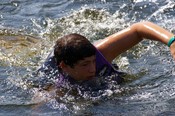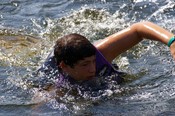 I don’t know about you, but I’ve always struggled with the idea of “working out.” Nowadays, the endless barrage of fitness equipment ads and gym membership offers are almost inescapable. Am I doomed, never to achieve “total fitness” unless I religiously visit my local gym a number of days per week, or sign up for the “easy payment plan” for the latest, greatest exercise machine?
I don’t know about you, but I’ve always struggled with the idea of “working out.” Nowadays, the endless barrage of fitness equipment ads and gym membership offers are almost inescapable. Am I doomed, never to achieve “total fitness” unless I religiously visit my local gym a number of days per week, or sign up for the “easy payment plan” for the latest, greatest exercise machine?
I hope not!
Now, don’t get me wrong. I’m a firm believer that we should be good stewards of all that God has given us – our time, our finances, our talents…AND our health. They’re all interrelated after all. As the director of adventure programming at a large Christian camp and retreat center, my ministry position requires me to be physically fit. How can God use me in my current role if I’m not physically able to make the hike to a remote cliff, where I’ll be able to share about trusting God with participants following their 100’ rappel?
Since I’m not a big fan of traditional workouts, I’ve had to get a little creative in finding activities that help to keep me in shape. These are fun outdoor activities you can do with your family and friends. Each will give you a great summer workout. Here’s a list of some of my favorites…
 Geocaching
Geocaching
If you’re a technology buff and you’re searching for an excuse to get outdoors, look no further. Think of geocaching like a global treasure hunt. Utilizing the Global Positioning System and any of a number of readily available portable receivers, participants using coordinates found on the internet attempt to locate hidden objects. Accessing the Global Positioning System doesn’t cost anything, and handheld GPS receivers start around $100.
 Once you have access to a GPS unit, the best place to start your geocaching experience is by visiting www.geocaching.com. This website is a database containing detailed descriptions of over 600,000 caches located in over 100 countries worldwide. Finding a list of caches in your area is as simple as entering your zip code. Since caches range in difficulty from easy walks to demanding hikes that may take an hour or more to complete, geocaching is an activity that’s easily enjoyed with friends or family.
Once you have access to a GPS unit, the best place to start your geocaching experience is by visiting www.geocaching.com. This website is a database containing detailed descriptions of over 600,000 caches located in over 100 countries worldwide. Finding a list of caches in your area is as simple as entering your zip code. Since caches range in difficulty from easy walks to demanding hikes that may take an hour or more to complete, geocaching is an activity that’s easily enjoyed with friends or family.
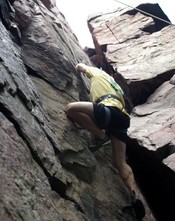 Rock Climbing
Rock Climbing
Once regarded as a sport reserved for adrenaline junkies in remote locations, the proliferation of indoor climbing gyms has made climbing available to the masses. Many gyms allow users to rent equipment, eliminating the need to purchase pricy items such as climbing harnesses, climbing shoes, etc. There’s usually a fee associated with gym climbing, but it’s not terribly expensive. Gyms in my area for example charge an average of $12 to climb all day.
Climbing provides a great overall workout. You’ll pump all the major muscle groups while getting the heart & lungs going. Artificial walls often utilize manufactured climbing holds that are ergonomically designed. Specific paths to follow, called “routes”, are set at various levels of difficulty, allowing everyone from
beginners to experienced climbers the opportunity to climb routes appropriate for their ability and skill level.
 Worried about the safety of climbing? As a risk manager, I’ll tell you it’s good to have a healthy respect for gravity. Climbers are protected during their climb by a backup called a “belay.” In some gyms, the belay is provided by a mechanical device called an auto-belay. These systems consist of a rope or cable attached to the climber that is automatically retracted as they advance up the wall. Once they complete their climb, the system slowly lowers the climber back to the ground. If an auto-belay system isn’t available, the belay is provided by another person who manually takes in the rope for the climber using a technique that allows them to control the rope & safely lower their climber. You don’t want to attempt to belay without first obtaining thorough training from a qualified source. Many climbing gyms offer classes in belaying.
Worried about the safety of climbing? As a risk manager, I’ll tell you it’s good to have a healthy respect for gravity. Climbers are protected during their climb by a backup called a “belay.” In some gyms, the belay is provided by a mechanical device called an auto-belay. These systems consist of a rope or cable attached to the climber that is automatically retracted as they advance up the wall. Once they complete their climb, the system slowly lowers the climber back to the ground. If an auto-belay system isn’t available, the belay is provided by another person who manually takes in the rope for the climber using a technique that allows them to control the rope & safely lower their climber. You don’t want to attempt to belay without first obtaining thorough training from a qualified source. Many climbing gyms offer classes in belaying.
Disc Golf
I was introduced to disc golf when I noticed a few of my staff throwing some distinctive looking Frisbees at some improvised targets here at camp. They were soon educating me about the rules, difference between “putters” and “drivers,” etc. As someone who couldn’t hit a golf ball accurately to save his life, I found myself enjoying trying to score under par. I was also aware that I was getting an unintended workout after the first few “holes.”
As the popularity of disc golf continues to grow, it’s not uncommon to find courses available in municipal parks, often with no cost to users. The fact that disc golf Frisbees are much less expensive than their ball golf counterpart makes this a great activity that can be enjoyed with minimal financial investment.
For more information about disc golf, visit the website for the Professional Disc Golf Association (www.pdga.com)
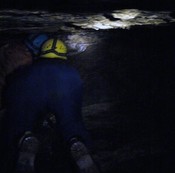 Caving/ Spelunking
Caving/ Spelunking
If you’re looking for a workout that can be educational as well as physical, caving might be for you. Now, the kind of caving I’m referring to is not the paved sidewalk, electric lights, tourist kind of cave. No, to really appreciate caving, you have to be willing to get dirty.
I remember the first time I went caving. Experiencing absolute darkness is truly amazing. You can wave your fingers right in front of your nose & you can’t see anything! We frequently take church youth groups to a cave near our camp in western Wisconsin. Once deep inside, we’ll turn off all our headlamps & just sit in the
darkness. After a few minutes, one of our guides turns on a keychain light & it lights up the whole chamber. This provides a powerful lesson, how we as Christians can be a light in a dark world.
As a workout, it depends on the cave. Some caves are pretty simple, requiring crawling & squeezing through passages & openings. Because of uneven footing, your core gets a good workout as you work to keep your balance. Other more technical caves may require ropes, harnesses, and other specialized gear.
Ah, that safety word again. Going into a cave for which you haven’t prepared will only lead to trouble. It’s best to connect with other, more experienced, individuals who can get you started in caving properly.
To find caving clubs in your area, visit the National Speleological Society’s website (www.caves.org.)
Swimming
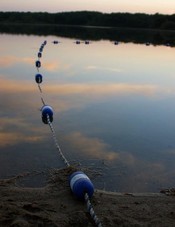 A traditional form of exercise? On my list? Ok, I’ve always loved being around water. Swimming is a great workout for people of all ages, working all the major muscle groups.
A traditional form of exercise? On my list? Ok, I’ve always loved being around water. Swimming is a great workout for people of all ages, working all the major muscle groups.
For access to pools, you definitely have options beyond the larger fitness clubs. A YMCA membership might work for you. Public schools with pools sometimes offer swim times that are open to the community for very reasonable rates (the high school where my wife works charges two dollars per session!). City and state parks, universities, hotels and resorts, your local neighbors and members of your church and amusement parks are all places where you can find great pool fun. Many of these pools may include water slides, ocean sized waves, fountains and even body surfing. For a more natural and often more peaceful setting search near your home for access to lakes, streams and other natural water areas where you can swim safely.
Adventure Challenge Courses
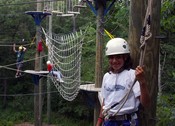 Think of adventure challenge courses as a kind of obstacle course. Once relegated to camps and experiential education providers, challenge course can now be found at universities and school districts. Known for their benefits in promoting self-confidence and teamwork, challenge courses have even been appearing in
Think of adventure challenge courses as a kind of obstacle course. Once relegated to camps and experiential education providers, challenge course can now be found at universities and school districts. Known for their benefits in promoting self-confidence and teamwork, challenge courses have even been appearing in
municipalities as part of their parks and recreation programs. Families and community groups can reserve time on the course & reap the benefits of these unique activities.
Challenge courses can be broken down into two main categories. “Low Ropes” involve obstacles near to the ground that usually don’t require specialized safety equipment. “High Ropes” require safety equipment, such as harnesses, helmets, etc., due to the height of the obstacles. Both low and high ropes activities will push you mentally & physically.
Safety? Glad you asked. Any quality program will have their courses built & inspected regularly by a qualified professional vendor who applies standards from organizations such as the Professional Ropes Course Association (www.prcainfo.org) or the Association of Challenge Course Technology (www.acctinfo.org) when reviewing a course.
Day Hikes
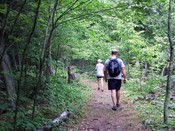 This is probably the simplest of my workouts, and can be summed up in two words – get outside! The intensity of the workout depends on the terrain and how hard you push yourself while on the trails. I also love the quiet and being aware of God’s unmistakable presence through the beauty of His creation (see Romans 1:20).
This is probably the simplest of my workouts, and can be summed up in two words – get outside! The intensity of the workout depends on the terrain and how hard you push yourself while on the trails. I also love the quiet and being aware of God’s unmistakable presence through the beauty of His creation (see Romans 1:20).
Some of the most spectacular day hikes you’ll ever experience are along the trails in national parks and national forests. These areas offer dramatic landscape, unparalleled beauty, habitat conservation and ecological preservation. Because these destinations are jewels of God’s global creation you’ll likely find diverse people from throughout the world also enjoying a day hike. Go to www.nps.gov for a complete list. If you can’t make it to a national park you’ll find that many cities and urban areas have developed very nice and safe longer-distance walk areas. These “rails to trails” green spaces are popular not only for hiking but running, biking, in-line skating and more.
Equipment-wise, you really don’t have to invest a lot of money in it. Actually, a good pair of shoes is really all you need to get started. Beyond that, a small backpack to carry an extra jacket, a water bottle, or small meal will take you far.
Where can you find out about hikes in your area? You can start by visiting REI’s website (www.rei.com) and looking for hiking guide books. A quick search while writing this article produced such titles as “60 Hikes Within 60 Miles of Chicago”, “Best Hikes with Children in Michigan”, and many others.
For a great workout these seven activities deliver individual and group fun, spiritual renewal and incredible exercise. I hope my personal favorites have inspired you to think beyond the traditional workout and try some new experiences this summer.


